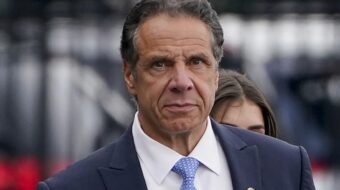Original source:
If vetoes are like slapshot goals in hockey, then Gov. Tim Pawlenty scored an election-reform hat trick last week. After vetoing motor-voter and felon-notification, he scotched the state Legislature’s big omnibus elections bill.
The measure included provisions drawn from at least eight separate bills, from an earlier primary date to absentee-ballot streamlining. While the bill was not everything reformers had sought — no early voting, for instance — it would have made dozens of improvements to the current system.
All fell to Pawlenty’s veto pen because the bill didn’t meet Republicans’ demand for new photo-ID requirements.
“Omnibus election bills making changes to our election process should be bipartisan. Unfortunately, this bill fails that test,” Pawlenty wrote in his veto letter (pdf) — a criticism he leveled at the other attempts at election reform as well.
The omnibus bill contained a long list of measures, minor and major, meant to improve Minnesota’s elections procedures.
Mike Dean, who directs the Minnesota office of the nonpartisan government-reform group Common Cause, laid the blame for the bills’ lack of bipartisan support at the feet of Pawlenty’s fellow Republicans in the state Legislature.
Their insistence on language mandating that prospective voters present photo identification was itself patently partisan, Dean said; the pool of voters for whom such a requirement is a problem likely leans left politically. In his view, Democrats correctly interpreted such changes to state election law as anti-DFL.
Interviewed hours before Pawlenty’s third election-reform veto, Dean called the first two vetos “disappointing and disingenous.” With them, Pawlenty discarded benefits that he claims to back, such as improved voter integrity and cost-savings for cities and counties.
Erin Sapp, election-reform project director at Heartland Democracy, likewise lamented that “Republican haven’t voted on the merits.”
Her group, a 501(c)3 nonprofit, has produced a report calling for universal voter registration — a goal that the motor-voter bill would have brought Minnesota closer to, by signing up driver’s-license applicants to vote (with opt-out available).
Almost every other democracy in the world has more liberal laws governing who can vote, Sapp said; indeed, in America, “voter registration is meant to bar people from voting.” Neighboring North Dakota has early voting and is the only state to do without voter registration altogether.
Too little, too late?
If Democrats “had been able to push [the omnibus bill] through earlier, they could have picked up 10 moderate-Republican votes,” Dean said — enough to override a veto or push Pawlenty to sign the bill.
With the contested Norm Coleman-Al Franken election providing a daily reminder of the need for reform, why didn’t the Legislature act sooner in the session? The Senate dispute itself was one reason — though not a good one, in Dean’s estimation.
“There was a hesitancy in leadership in the House because of the ongoing Senate trial,” he said — a wariness of an incorrect public perception that “changing state law would influence the trial.”
Reformers can try again next year, as Pawlenty himself suggested in his veto letter. Perhaps it’s more reasonable to expect that major changes like early voting would have a chance when the Coleman-Franken dispute is behind us. (That’s the gist of a Wednesday Pioneer Press editorial.)
But by the time the puck drops for the reconvened Legislature next February, Minnesota will likely have a second senator securely seated and the public’s sense of urgency on election reform may be lost — leaving the two sides to repeat this year’s face-off on reforming elections.









